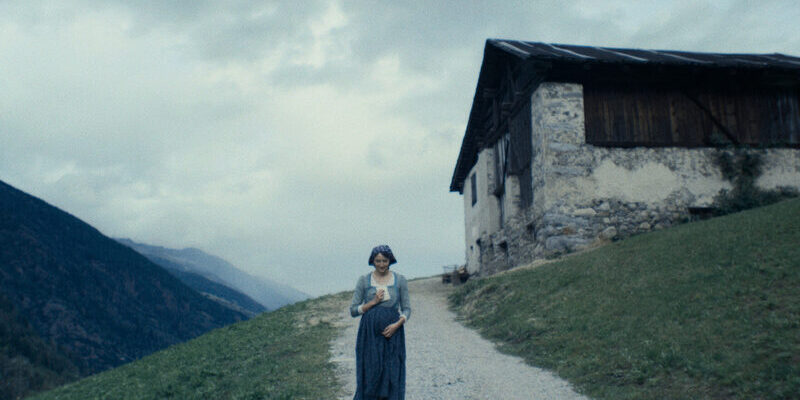
Review by
Benjamin Poole
Directed by: Maura Delpero
Starring: Giuseppe De Domenico, Tommaso Ragno, Martina Scrinzi, Roberta Rovelli, Carlotta Gamba, Orietta Notari, Sara
Serraiocco

High up in the remoter regions of the early morning Italian alps, a
late-teen girl milks a cow. Her motions are executed with practised care;
vitally so, as the resultant lactate will form breakfast for the crowded
household which she is a part of (prior to this scene, shot in tableaus
with all the halcyon quietude of a painting, we have been shown children
sleeping three to a bed within the various rooms of her modest family
cottage). The sequence is an early assertion of Vermiglio's meticulous construction of verisimilitude: writer/director
Maura Delpero's period detail is consistent throughout, yet it is
scenes like this, where we see characters actively connecting with their
environment, that fully immerse us into the rustic universe of her film.
The year is 1944, yet the war is something occurring upon a different
plane to the snowed peaks and dense forestry of these alpine environs.
Nonetheless, trouble, and narrative triggers, occur with the arrival of
two deserters from the Italian army...

Named for the mountain village where it is set, Vermiglio is
a study of an enclosed community and its relationship with an encroaching
wider world. The aforementioned dairy hand, Lucia Graziadei (Martina Scrinzi), at a threshold stage in her life and maturity, is our focal point as
the village reckons with change.
Garlanded with festival awards and nominations (the film is Italy's Oscar
hopeful), Vermiglio is utterly gorgeous. Early on,
Mikhail Krichman's cinematography essays the endless verdant ice of
the dolomites in striking sweeps of bright white and deep greens (a shame
to watch this via a screener): his exteriors have the mien of Caspar David
Friedrich, with the denizens of the Graziadei family depicted tiny against
towering nature (significantly soundtracked by Vivaldi, the film will take
us through four seasons of the landscape, with the climate of each quarter
impacting the village differently). The interiors are more Vermeer, with
natural light and a muted palette of blues and greys deployed as we switch
between the Graziadei homestead and the village school, where patriarch
and village statesman Cesare (Tommaso Ragno) is the sole teacher;
his weekday class made up of children of all ages (some of whom are his
own), and an adult Saturday lesson wherein the deserters, among other
village men, learn English.

Vermiglio is a cold world in more ways than the atmosphere. The
perpetually pregnant matriarch (Roberta Rovelli) chastises Cesare
for spending money on vinyl records, such as the above-mentioned Vivaldi,
arguing that she must "count the children's potatoes" when serving supper.
A baby is born with critical issues at a house birth (a recurrent
situation) and Cesare stoically accepts that "if God wants to take back
this child, there is nothing we can do." Furthermore, the parents can only
afford to send one of their many children to school, with the rest
expected to stay in the village with all its rigid simplicities.
While there is love and care in the family, the community is sequestered.
Links to a world outside - the records, Cesare's secret stash of
proto-pornographic images, the soldiers - bring promise of freedoms beyond
the mountains, but at a certain price. Middle child Ada (Rachele Potrich
in an astonishing performance) experiences an awakening looking at the
monochrome smut, yet it is an understanding of a sexuality doomed to be
unfulfilled. Similarly, is the rapid pace which Lucia falls in love, gets
with child, and ultimately marries army runaway Pietro (Giuseppe De Domenico), catalysed by a need to escape, to feel something vital and different?

As in Eden, another simple paradise beholden to rules regarding
opportunities for women, Lucia's romance is a whim which doesn't portend
well for her, or the family, when it transpires that Pietro's connections
and obligations to the world at large are more fatefully meaningful than
he at first made clear.
In the deft hands of Delpero, who cut her teeth making documentaries, we
view a slow unfolding of events, the inevitable turn of the seasons, as a
deeply engaged observer; even watching a character washing bed linen is
rendered utterly riveting. Nonetheless, despite the severity of the
community and the inclement conditions, Delpero's storytelling is light
and inviting, even (via the younger cast) including flashes of humour in
moments of warmth which feel like sun on the face. Perhaps, in the manner
of giddied Lucia, you too will fall in love with this completely
accomplished film.

Vermiglio is on UK/ROI VOD now.

